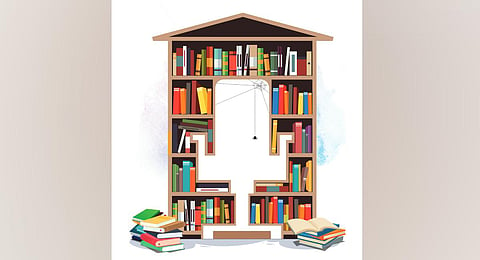Reviving public libraries will strengthen education
In a thought-provoking article titled “To restore civil society, start with the library,” renowned American sociologist Eric Klinenberg highlighted the pivotal role that libraries play in fostering vibrant democratic cultures. While his insights were primarily directed at America, it’s uncanny how applicable they are to the context of Tamil Nadu where the public library movement is struggling to survive.
Klinenberg aptly describes a library as “a place where people of diverse backgrounds, aspirations and interests participate in a vibrant democratic culture.” It is a space where government support, individual contributions and donor efforts converge for a higher purpose.
Regrettably, Klinenberg observes a declining trend in government support for these vital institutions. With the convenience of platforms like Amazon, some economists argue that people have shifted from libraries to book purchases, and the footfall in libraries has dwindled.
However, the history of public libraries in India is illustrious. Long before the global public library movement gained momentum, India had a strong tradition of public libraries. The 19th-century renaissance of public libraries globally rekindled this tradition. Noteworthy contributions from British rulers such as the ‘Imperial Library Act’ of 1902 transformed libraries like the Public Library of Calcutta into national treasures. Sayajirao III Gaekwad’s initiative to bring the famous American librarian, William Alanson Borden, to establish a public library in Baroda marked another milestone.
Tamil Nadu, with its rich heritage, became the first Indian state to introduce a Public Library Act. A dedicated Directorate for Public Libraries was established here in 1972. Yet, the current state of public libraries in Tamil Nadu is cause for concern.
Both schools and higher education in Tamil Nadu have failed to make libraries a necessity. Even PhD research scholars seldom utilise these valuable resources, and teachers are no exception.
The honourable Chief Minister of Tamil Nadu, who has been taking progressive steps to improve government schools, deserves applause for establishing a substantial ‘Kalaignar Centenary Library’ in Madurai. The state government’s efforts have substantially increased literacy rates and the number of libraries across Tamil Nadu. The next crucial step is integration.
If the state government formulates a policy to integrate public libraries with the education system, it will not only breathe new life into these institutions but also elevate the quality of education across the state. This visionary approach can rekindle the pride and significance of public libraries in Tamil Nadu, aligning with the ideals of fostering a democratic and inclusive society.
Integrated policy
If the state formulates a policy to integrate public libraries with the education system, it will not only breathe new life into these institutions but also elevate the quality of education
Footnote is a weekly column that discusses issues relating to Tamil Nadu.
D Ravikumar of VCK is a Lok Sabha MP from Villupuram and an author

